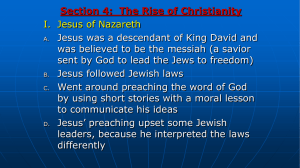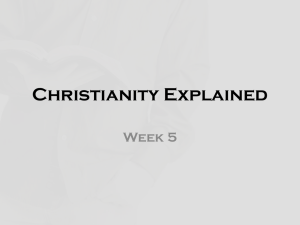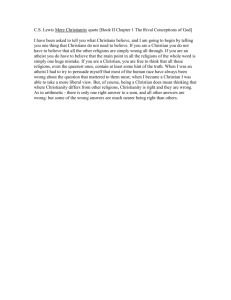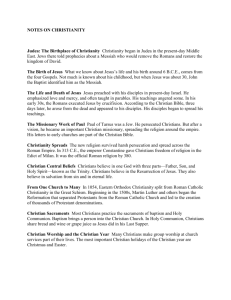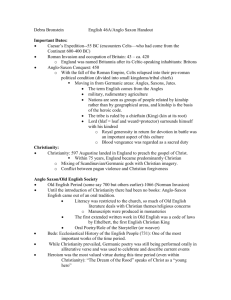Document 10465876
advertisement
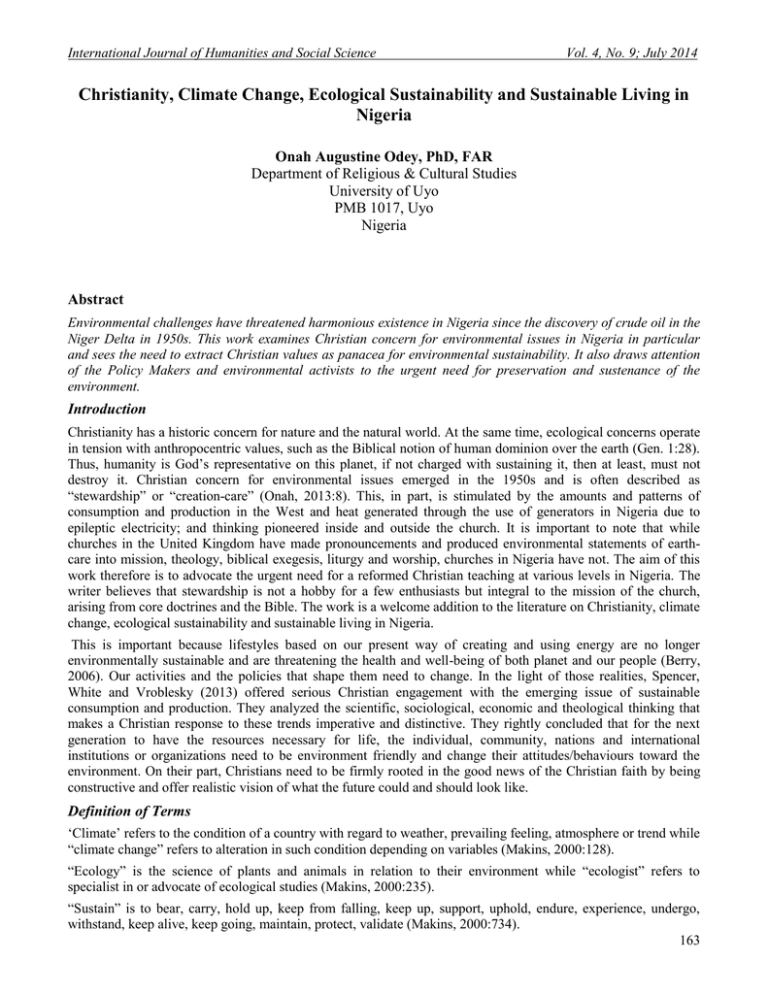
International Journal of Humanities and Social Science Vol. 4, No. 9; July 2014 Christianity, Climate Change, Ecological Sustainability and Sustainable Living in Nigeria Onah Augustine Odey, PhD, FAR Department of Religious & Cultural Studies University of Uyo PMB 1017, Uyo Nigeria Abstract Environmental challenges have threatened harmonious existence in Nigeria since the discovery of crude oil in the Niger Delta in 1950s. This work examines Christian concern for environmental issues in Nigeria in particular and sees the need to extract Christian values as panacea for environmental sustainability. It also draws attention of the Policy Makers and environmental activists to the urgent need for preservation and sustenance of the environment. Introduction Christianity has a historic concern for nature and the natural world. At the same time, ecological concerns operate in tension with anthropocentric values, such as the Biblical notion of human dominion over the earth (Gen. 1:28). Thus, humanity is God’s representative on this planet, if not charged with sustaining it, then at least, must not destroy it. Christian concern for environmental issues emerged in the 1950s and is often described as “stewardship” or “creation-care” (Onah, 2013:8). This, in part, is stimulated by the amounts and patterns of consumption and production in the West and heat generated through the use of generators in Nigeria due to epileptic electricity; and thinking pioneered inside and outside the church. It is important to note that while churches in the United Kingdom have made pronouncements and produced environmental statements of earthcare into mission, theology, biblical exegesis, liturgy and worship, churches in Nigeria have not. The aim of this work therefore is to advocate the urgent need for a reformed Christian teaching at various levels in Nigeria. The writer believes that stewardship is not a hobby for a few enthusiasts but integral to the mission of the church, arising from core doctrines and the Bible. The work is a welcome addition to the literature on Christianity, climate change, ecological sustainability and sustainable living in Nigeria. This is important because lifestyles based on our present way of creating and using energy are no longer environmentally sustainable and are threatening the health and well-being of both planet and our people (Berry, 2006). Our activities and the policies that shape them need to change. In the light of those realities, Spencer, White and Vroblesky (2013) offered serious Christian engagement with the emerging issue of sustainable consumption and production. They analyzed the scientific, sociological, economic and theological thinking that makes a Christian response to these trends imperative and distinctive. They rightly concluded that for the next generation to have the resources necessary for life, the individual, community, nations and international institutions or organizations need to be environment friendly and change their attitudes/behaviours toward the environment. On their part, Christians need to be firmly rooted in the good news of the Christian faith by being constructive and offer realistic vision of what the future could and should look like. Definition of Terms ‘Climate’ refers to the condition of a country with regard to weather, prevailing feeling, atmosphere or trend while “climate change” refers to alteration in such condition depending on variables (Makins, 2000:128). “Ecology” is the science of plants and animals in relation to their environment while “ecologist” refers to specialist in or advocate of ecological studies (Makins, 2000:235). “Sustain” is to bear, carry, hold up, keep from falling, keep up, support, uphold, endure, experience, undergo, withstand, keep alive, keep going, maintain, protect, validate (Makins, 2000:734). 163 © Center for Promoting Ideas, USA www.ijhssnet.com “Environment” means habitat, scene, setting, situation, surroundings, territory (Makins, 2000:734). The Bible and Sustainable Living Genesis, the first book of the Bible, derived its name from a Greek word meaning “origin” or “beginning”, which is the title given to the book in the Greek Septuagint. The Hebrew name for the book is bereshith, from Genesis 1:1 (“in the beginning”). A broader outline of the book divides it into two unequal sections. Genesis 1:1 through 11:26 describes the creation of the heavens, the earth, plants, animals and man; the fall and the Edenic curse; the antediluvian age and the great flood; and the descendants of Noah down to Terah. Genesis 11:27 through 50:26 traces the history of Abraham and Lot; Ishmael and Isaac; Jacob and Esau; Joseph and his brethren in Egypt. Genesis reveals that God created the heavens and the earth as a dynamic, functioning entity. Thus, even as Adam was created instantly as a grown man, so also the earth and its living creatures were created fully “grown” within six days, with the oceans already containing the salts and chemicals necessary for sustaining marine life (1:2, 10, 20), the dry land equipped with a manite of soil for plants and trees (1:11), the light rays from distant stars already performing their God-intended function of shinning upon the earth (1:14 – 19) and the animals and plants created after their kinds (1:11, 12, 20 – 25). The “grown creation” doctrine is simply the biblical doctrine of creation rightly understood and is illustrated in the new testament by the miracle of the changing of water to wine (John 2:1-11) (Bryant. 1967, 194). Jesus, in common with all Jewish rabbis, often taught in parables. A parable is a comparison. It can be but a simile, a short saying or a complete story. In Jesus’ parable of hidden growth-the seed growing secretly (Mark 4:26-29), it is likely that when Jesus told it he was teaching that the kingdom had already come. The seed of the kingdom had been slowly growing throughout Jewish history. Now all was ready for Jesus to harvest the result. For the first Christians the parable described the spread of Christianity during the period between the ascension and the second advent. Jesus’ coming seemed long delayed, but the parable suggested the reason; although nothing appeared to be happening, the harvest was on its way and Jesus the Great Harvester would appear in due time (Campbell, 1966:145). The Mustard Seed (Mark 4:30-32; Luke 13:18-19; Matthew 13:31-32) is a parable about rapid growth “small as a grain of mustard seed” was a Jewish proverb yet from very small beginnings the mustard seed can, in a short time, grow into a shrub as much as six feet high. It is probable that when Jesus first told the parable, he wished to point out that the kingdom had come, and like a mustard tree, was already casting its shadow for those who wished to shelter under its branches (Daniel 4:12, 21; Ezekiel 17:23; 31:6). For the first Christians, the parable would speak of the rapid growth of the kingdom in their own age of missionary activity. They regarded the spread of the Christian religion as a matter of great urgency, for the Christian community was the mustard seed of the kingdom, and that must be fully grown before the expected early return of Jesus (Campbell, 1966:146). Jesus’ parable of the Tares (Matthew 13:24 – 30, 36 – 43) is not unlike that of the seed growing secretly (Mark 4:26-29), for the seed is sown, and the harvest awaited, but before it can be gathered a sorting out is required. Jesus was probably thinking here of the Jewish nation as the kingdom of God containing elements both good and bad. Jesus and his disciples were the reapers about the help the wheat sort itself from the tares. The early Christian interpretation of the parable is found in Matthew 13:36 – 43, which most scholars agree is not part of the original. Here the growing of wheat and tares together belongs not to Jewish history, but to the interval between the ascension of Jesus and his second advent (Campbell 1966: 146). In the parable of the Dragnet (Matthew 13:47 – 50), a fisherman sorts out his catch as a farmer does his harvest. Here, possibly, Jesus is thinking of himself and his disciples as fishers of men, checking what people qualify themselves to be in the kingdom. But, it is possible also that Jesus was here warning his disciples that, in their work for him, they would find unworthy as well as worthy men claiming membership of the kingdom. This was the meaning of the parable for the early Christians, and it is probably their interpretation that is found in Matthew 13:49 – 50. In their view, the sorting out of the good and bad within the kingdom would take place at the second advent and final judgment (Matthew 25:36-46). 164 International Journal of Humanities and Social Science Vol. 4, No. 9; July 2014 Christianity and Sustainable Communities Christianity’s concern for sustainable community and sustainable development has historical roots in what many observers refer to as “the social question” or “the modern social problem”. The reference is to the last three decades of the 19th century, when progressive social theorists in Europe and North America joined popular movements of reforms, especially workers’ movements, to protest the exploitative character of rapidly developing industrial society. In giving voice to brutalizing social conditions, reform – minded clergy and laity of the social gospel movement, labour leaders and workers, and academic students of society developed an extensive critique of the capitalist industrial order and of political and economic efforts to govern it. In varying ways and degrees they pointed to class suffering (especially poverty and dangerous working conditions, inequality and unemployment) as these were compounded by race, gender, ethnic and cultural discrimination. And they undertook organized responses to “the modern social problems” (various protest movements with political economic platforms, including both religious and secular socialism). Present Christian concern for sustainable development and community draws on the fact that the social question persists as these have, in many ways, gone global (Bouma-Prediger, 2001). During the same period, the social question was joined by the “ecological question”. The language of sustainability itself arose here, with some of its first uses in the ecumenical movement. It is instructive to note that “sustainable” as applied to society in this context, and not simply the yield of forests or fisheries, was a mark of the 1975. World Council of Churches (WCC) program “Toward a Just, Participatory and Sustainable Society” (Bauckham, 2002). While the causes are many, the ecological question, too, chiefly arises from the destructive downside of the organization and habits of modern industrialized society whether in the form of corporate capitalism, state socialism, or the competition of these two over decades around the modernization and alignment of non-industrialized or “developing” nations like Nigeria. In a word, what has given rise to concern for sustainable development and sustainable community on the pat of Christianity is the unending transformation of nature knit integrally to the unending transformation of society as these together have degraded land, sea, air and human communities in the very process of yielding the benefits of modernity. Few seriously propose a return to pre-modern worlds. Yet the present course is itself considered unjust and unsustainable (Pickering, 2004). Two broad streams of response have followed. One is the search to understand the roles Christianity has played in the travail of society and nature together in the modern period. Sometimes attention is to roughly the last five centuries, beginning with the onset of colonization, conquest, and conversion on the part of Christian. Europe, while other times the attention is to the last two centuries especially – the industrial era. The other search is for concrete constructive Christian responses to the “eco-crisis” as that has been given voice from the 1970s onward. Christian-identified groups have often joined other Non-Governmental Organizations (NGOs). The internal critique has been extensive. Most of it turns on the complicity of dominant streams of Western Christianity in the making of the modern world. Religiously sanctioned racial, cultural and gender stratification and oppression are pointed together with callousness about the fate of the land and neglect of the requirements of earth itself for its own flourishing. Christian habits that combine anthropocentricity with assumptions of the superiority and forms of Western Christian civilization are the subject of detailed analysis. In this worldview God has been separated from nature and the purposes of divine action (salvation, redemption) have been relocated in human history. Humanity itself has been separated from the rest of nature as a unique creation and set in history as a specifically divine/human domain. And throughout pervasive dualisms of nature and society have been reinforced by church teaching and practice (men are set over women), the rights of humans over the rest of nature, and the dominance of Western technologies and cultures over subjugated people, their religions, cultures and lands. The response to self-examination on the part of Christianity is ongoing. The last decades of the twentieth century have seen the rise of several “eco-theologies”, the broadening and deepening of multiple analyses of Christianity place in the making of the modern world that go beyond analyses of dominant mainstream Western Christianity to emphasize the resistance to it in the Christianity of indigenous and other subjugated peoples and perspectives; and the explosion of Christian participation in both faith-based and NGO efforts to address socio-environmental maladies around the world (Mckeowo, 2004). 165 © Center for Promoting Ideas, USA www.ijhssnet.com On-the-ground organized Christian efforts-achieved a certain focus with the United Nations. Conference on Environment and Development in Rio de Janein in 1992 (Northcott, 2005). That conference, the largest gathering of heads of state to that date, with parallel participation by the largest gathering of NGO’s, gave rise to the specific language of “sustainable development” – the capacity to meet the needs of present generations without jeopardizing the capacity of future generation to meet theirs. “Sustainable development” has since become common discourse amid the international efforts to address the social and ecological questions together. Yet, sustainable development as a shared agenda has encountered dissent from the outset, some of it from Christian communities and some of it already in view of the Earth Summit (Climate Forum, 2002). Many active participants among environmental NGOs regard sustainable development as yielding too much to economic globalization’s efforts to integrate local, regional, and national economies into a single global economy as led by corporate capitalism. For these disserting groups – prominent at international meetings of the World Trade Organization, World Economic Forum, and the “G7” (advanced industrial) nations from Seattle to Davos to Genoa to New York in the 1990s and the first decade of the 21st century – greening global capitalism so as to render both the environment and the economy “sustainable” does not truly address social inequities or root causes of environmental degradation. The dissenters’ point of departure asks instead what it is that makes for healthy community? They then seek to wrap both economy and environment around that, on successive levels (local, regional, transnational), all the time being aware that Earth’s requirements are fundamental. The human economy is a subset of the economy of the earth. “Sustainable community”, as distinct from “sustainable development”, thus tries to preserve or create some mix of the following: greater economic self-sufficiency locally and regionally, with a view to the bio-region themselves as basic to human organizations; agriculture appropriate to regions and in the hands of local owners and workers using local knowledge and crop varieties, with ability to have their own seeds and treat their own, plants and soils with their own products; the preservation of local and regional traditions, language and cultures and a resistance to global homogenization of culture and values; a revival of religious life and a sense of the sacred, vis-à-vis a present way of life that because it reduces life to the utilitarian, has little sense of mystery and the sacred, the repair of the moral fiber of society on some terms other than material consumption; resistance to the commoditization of all things, including knowledge, the internalization of costs to local, regional and global environments in the price of goods and services themselves, and the protection of ecosystems and cultivation of Earth as a “commons”. All this is viewed, in the eyes of its advocates, as global democratic community rather than nativist localism. It is global by virtue of its planetary consciousness and the impressive networking of citizens around the world made possible by electronic globalization. Yet its orientation is first of all local in that the key question for sustainable community advocates is how cultural wealth and biological wealth, together with economic well-being are sustained in the places people live together with the rest of the community of life. In the Niger Delta Regions of Nigeria, environmental consciousness recognized by the international community was led by Ken Sasa – Wiwa (1941 – 1995), from Ogoni (Bayelsa State), a former Ibadan University Don and former commissioner in Rivers State and until his death, a businessman and playwright. A courageous intellectual man, who started by attending conferences in Europe and America on human rights. He started championing the cause of the minorities in Nigeria and formed the Movement for the Survival of the Ogoni People (MOSOP) in 1990. He brought his agitation into international level. He agitated against corrupt military dictatorship and the uncaring attitude of the multinational oil companies whose activities devastated farmlands, totally polluted the atmosphere, contaminated water, poisoned trees, and the flora and fauna virtually disappeared. He led his people in 1993 to ask for the restoration of the environment and the provisions of basic necessities of life; water, electricity and education – and above all – the right to self determination so that the people can be responsible for their resources and environment (Daminabo, 2005: 298). Conclusion and Recommendations This work offers three things. First, it is a reminder that if the world is to mount any kind of defense against global warming, we Christians must play a much stronger role. Not just because physics and chemistry demand it – but faith as well, as we rise to the greatest challenge to both creation and social justice the planet has ever faced. Secondly, it is rooted in sound biblical interpretation, and much practical wisdom on what we individually and collectively can and should do. Thirdly, it is written primarily from a Christian perspective on this important issue as most timely of reminders. It has taught a lot about the place of humans in the world and also the place of the environment and animals. 166 International Journal of Humanities and Social Science Vol. 4, No. 9; July 2014 It can be concluded that Christians are guilty of taking our privileged position as God’s children for granted. And worse still, of abusing this position, by using it for selfish ends. This certainly has implications for Christian mission. It engages them with the environmental problems of our world (Shiva, 1997). It’s here suggested that Christian groups should be active participants in the quest for sustainable community and in the debates about sustainable development. They equally need to join the search for ways of living that meet the norms of genuine sustainability, norms, etc such participations require the optimal inclusion of all stakeholders in socio-ecological decisions as their commitments to meet the basic material needs of all life possible; equity as basic fairness across generation and across the community of life; accountability as the structuring of responsibility in ways that price “transparency” (decision-making structures and processes that are clear and public); material simplicity and spiritual richness as markers of a quality of life that includes bread for all but is more than bread alone; responsibility on a scale that people can handle, that is, commensurate with workable community; and subsidiarity – resolving problems at the closest level at which decisions can be taken and implemented effectively, beginning with local resources and talents (Toolan, 2001). In addition to joining the quest for sustainable practices, Christian groups are encouraged to respond to the critique of their own past by undertaking the retrieval and transformation of Christian faith traditions and practices that are explicitly Earth-positive traditions and practices that address socio-ecological questions in ways resonating with faith as it has been expressed over millennia. Varieties of ascetic, mystical, sacramental and prophetic-liberative practices should all be involved. Finally, since environmental problems are religious based, we need religions to resolve the crisis. Therefore, as creative beings. We need to use our various religions to preserve and sustain our environment. To achieve this, it is recommended that government at all levels should enact and enforce laws to environmental degradation and other environmental vices arising from the practice of religion. Furthermore, educational institutions at all levels should do a matter of policy, adopt and integrate an eco-ethical studies into their curriculum. Again, as a matter of urgency, Nigerian Inter-Religions Council (NIREC) as a Religious Body should ensure the implication of all government policies on the practice of religion within the context of sustainable environments. Notes and References Bauckham, R. (2002). “Joining Creation’s Praise God”, Ecotheology, 7(1), pp 45 – 59. Berry, R. J. (ed.) (2006). Environmental Stewardship, Critical Perspectives, Past and Present, London: T & T Clark. Bouma-Prediger, Steven (2001). For the Beauty of the Earth: A Christian Vision for Creation-Care. Grand Rapids: Baker Academic. Bryant, T. Alton (1967). The New Compact Bible Dictionary, Grand Rapids, Michigan: Dondervan Publishers House. Climate Forum (2002) [Online}, Available from: <http://www.climateforum2002.org.> Daminabo, A. O. (2005). Ken Saro – Wiwa (1941 – 1995): His Life and Legacies, Port Harcourt: Buguma Hanging Gardens Publishers. Makins, Marian (Ed.) (2000). Collins Shorter Dictionary and Thesaurus, Great Britain: Harper Collins Publishers Limited. Mckeown, John (2004). Christianity and Ecological Sustainability, <http://www.climateforum2004.org.> McKibben, Bill (2000). Deep Economy and the End of Nature. Available from: http://www.jubilee centre.org/online-documents/thedivineconomy.htm Northcott, M. (2005). “Wilderness, Religion and Ecological Restoration in the Scottish Highlands”, Ecotheology, 10(3), 382 – 399. Onah, A. O. (2013). “National President’s Welcome Address at the 34th Annual Conference of Nigerian Association for the Study of Religion”, Religion and Sustainable Environment, Nsukka: University of Nigeria. Pickering, D> (2004). “Lifestyle: Nailing their Green Colours to the Mast” Ecotheology, 9(1), 124 – 128. Spancer, Huw (1998). Tyrants, stewards – or just kings? In Linzey, Andrew and Yamamotu, Dorathy (Eds.), Animals on the Agenda: Questions About Animals for Theology and Ethics, London: SCM Press Limited, pp. 216 – 224. Spencer, Nick, Robert White, Virginia Vroblesky (2013). Christianity, Climate Change and Sustainable Living, online (JRI, 2007). Available from: http://www.jri.org.uk Toolan, David (2001). At Hom. Vandana, Shiva (1997), Biopiracy: The Plunder of Nature and Knowledge. Toronto: Between the Lines Press. Zerbe, G. (1992). “Ecology according to the New Testament” Direction, 21(2), 15 – 26. 167
